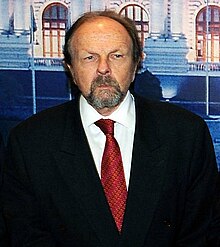Salomón Lerner Ghitis
Salomón Lerner Ghitis | |
|---|---|
 | |
| Prime Minister of Peru | |
| In office 28 July 2011 – 10 December 2011 | |
| President | Ollanta Humala |
| Preceded by | Rosario Fernández |
| Succeeded by | Oscar Valdés |
| Personal details | |
| Born | 4 February 1946 Lima, Peru[citation needed] |
| Political party | Independent[citation needed] |
| Alma mater | Universidad Nacional de Ingeniería |
| Profession | Industrial engineer, administrator |
Salomón Lerner Ghitis, also known as Siomi Lerner (born 4 February 1946)[1] is a Peruvian businessman and politician, who was the Prime Minister of Peru from 28 July to 10 December 2011 and leader of the political movement Citizens for Change (CxC). He was appointed prime minister following the 2011 general election which was won by Ollanta Humala.[2] Lerner resigned on 10 December 2011.[3]
Early life
[edit]Salomón Lerner is of Jewish descent.[4] He was born on 4 February 1946.[1] He studied in Anglo-Peruvian School. From 1962 to 1967, he studied industrial engineering with focus on agribusiness at the National University of Engineering (UNI) in Lima. Later he attended post-gradual courses at the Monterrey Institute of Technology in Mexico, in 1968, and at the Technion Institute in Haifa, Israel, in 1989. As a student, he joined politics and became the chairman of the students' wing of the social-democratic APRA party.[1]
Career
[edit]Under the left-wing military administration of Juan Velasco Alvarado (1968–75), he was general manager of the Public Fish-Meal and Oil Marketing Enterprise (EPCHAP). In the government of Velasco's successor, Francisco Morales Bermúdez, Lerner was vice minister of foreign trade. In 1997, he managed CPN Radio channel, and from October 1997 to March 1998, he was a member of the board of Frecuencia Latina. At the end of the 1990s, he served as the CEO of the Banco del Progreso. When the NBK bank acquired Banco del Progreso in 2000, he stayed CEO of the merged bank, until his resignation during the crisis in July of that year.
Other functions performed by Salomón Lerner include manager of Helicópteros del Sur, Tecal S.A., and the Cotton Corporation of Peru, president of the Institute for Economic and Social Development (Indes), and the industrial engineers' chapter in the Association of Peruvian Engineers (CIP).[1]
Political career
[edit]In 2001, Lerner was general coordinator of the Civil Association Transparencia which observed the 2001 general elections. Afterwards he became a member of the editorial board of the daily newspaper La República.[1] He also managed the campaign of left-wing nationalist Ollanta Humala for both the 2006 and the 2011 presidential elections.[5]
Prime minister
[edit]On 28 July 2011, newly elected president Ollanta Humala appointed Salomón Lerner to be President of the Council of Ministers of Peru.[6] His government had congressional support of the Peru Wins and Possible Peru parliamentary groups.[1] During his tenure, the government of Peru was marked by internal and external debate over the political orientation of the cabinet and Lerner's ability to control, the suspension of the President's 2nd Vice President and some members of Congress,[citation needed] coupled with social mobilisations and heavy protests, including a dispute over the $4.8 billion Conga gold mining investment project by a Canadian company.[which?] On 10 December, he resigned as Prime Minister, without directly referencing to the mining conflict and was succeeded by his Interior Minister Oscar Valdés.[3][4]
References
[edit]- ^ a b c d e f "¿Quién es Siomi Lerner, el primer ministro de Ollanta Humala?" [Who is Siomi Lerner, Ollanta Humala's prime minister], El Comercio (in Spanish), 21 July 2011
- ^ Moffett, Matt; Kozak, Robert (22 July 2011), "Peru Leader Taps Moderate Cabinet", The Wall Street Journal, retrieved 4 August 2011
- ^ a b "Peru PM Salomon Lerner in surprise resignation". BBC. 10 December 2011. Retrieved 13 April 2013.
- ^ a b Robert T. Buckman (9 August 2012). Latin America 2012. Stryker Post. pp. 341. ISBN 978-1-61048-888-4. Retrieved 13 April 2013.
- ^ "Peru's president names prime minister, finance minister". Andina. Lima. 21 June 2011. Archived from the original on 5 July 2013. Retrieved 13 April 2013.
- ^ "Peru's new cabinet". Cosmopolis. 13 December 2011. Retrieved 13 April 2013.
